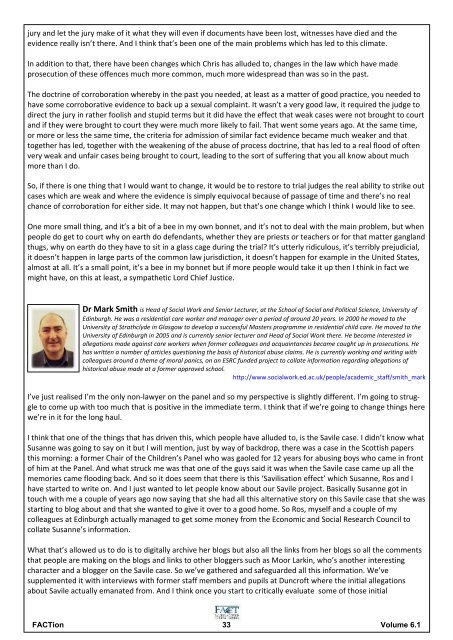FACTion-6.1-web-version
FACTion-6.1-web-version
FACTion-6.1-web-version
Create successful ePaper yourself
Turn your PDF publications into a flip-book with our unique Google optimized e-Paper software.
jury and let the jury make of it what they will even if documents have been lost, witnesses have died and theevidence really isn’t there. And I think that’s been one of the main problems which has led to this climate.In addition to that, there have been changes which Chris has alluded to, changes in the law which have madeprosecution of these offences much more common, much more widespread than was so in the past.The doctrine of corroboration whereby in the past you needed, at least as a matter of good practice, you needed tohave some corroborative evidence to back up a sexual complaint. It wasn’t a very good law, it required the judge todirect the jury in rather foolish and stupid terms but it did have the effect that weak cases were not brought to courtand if they were brought to court they were much more likely to fail. That went some years ago. At the same time,or more or less the same time, the criteria for admission of similar fact evidence became much weaker and thattogether has led, together with the weakening of the abuse of process doctrine, that has led to a real flood of oftenvery weak and unfair cases being brought to court, leading to the sort of suffering that you all know about muchmore than I do.So, if there is one thing that I would want to change, it would be to restore to trial judges the real ability to strike outcases which are weak and where the evidence is simply equivocal because of passage of time and there’s no realchance of corroboration for either side. It may not happen, but that’s one change which I think I would like to see.One more small thing, and it’s a bit of a bee in my own bonnet, and it’s not to deal with the main problem, but whenpeople do get to court why on earth do defendants, whether they are priests or teachers or for that matter ganglandthugs, why on earth do they have to sit in a glass cage during the trial? It’s utterly ridiculous, it’s terribly prejudicial,it doesn’t happen in large parts of the common law jurisdiction, it doesn’t happen for example in the United States,almost at all. It’s a small point, it’s a bee in my bonnet but if more people would take it up then I think in fact wemight have, on this at least, a sympathetic Lord Chief Justice.Dr Mark Smith is Head of Social Work and Senior Lecturer, at the School of Social and Political Science, University ofEdinburgh. He was a residential care worker and manager over a period of around 20 years. In 2000 he moved to theUniversity of Strathclyde in Glasgow to develop a successful Masters programme in residential child care. He moved to theUniversity of Edinburgh in 2005 and is currently senior lecturer and Head of Social Work there. He became interested inallegations made against care workers when former colleagues and acquaintances became caught up in prosecutions. Hehas written a number of articles questioning the basis of historical abuse claims. He is currently working and writing withcolleagues around a theme of moral panics, on an ESRC funded project to collate information regarding allegations ofhistorical abuse made at a former approved school.http://www.socialwork.ed.ac.uk/people/academic_staff/smith_markI’ve just realised I’m the only non-lawyer on the panel and so my perspective is slightly different. I’m going to struggleto come up with too much that is positive in the immediate term. I think that if we’re going to change things herewe’re in it for the long haul.I think that one of the things that has driven this, which people have alluded to, is the Savile case. I didn’t know whatSusanne was going to say on it but I will mention, just by way of backdrop, there was a case in the Scottish papersthis morning: a former Chair of the Children’s Panel who was gaoled for 12 years for abusing boys who came in frontof him at the Panel. And what struck me was that one of the guys said it was when the Savile case came up all thememories came flooding back. And so it does seem that there is this ‘Savilisation effect’ which Susanne, Ros and Ihave started to write on. And I just wanted to let people know about our Savile project. Basically Susanne got intouch with me a couple of years ago now saying that she had all this alternative story on this Savile case that she wasstarting to blog about and that she wanted to give it over to a good home. So Ros, myself and a couple of mycolleagues at Edinburgh actually managed to get some money from the Economic and Social Research Council tocollate Susanne’s information.What that’s allowed us to do is to digitally archive her blogs but also all the links from her blogs so all the commentsthat people are making on the blogs and links to other bloggers such as Moor Larkin, who’s another interestingcharacter and a blogger on the Savile case. So we’ve gathered and safeguarded all this information. We’vesupplemented it with interviews with former staff members and pupils at Duncroft where the initial allegationsabout Savile actually emanated from. And I think once you start to critically evaluate some of those initial<strong>FACTion</strong> 33 Volume <strong>6.1</strong>


